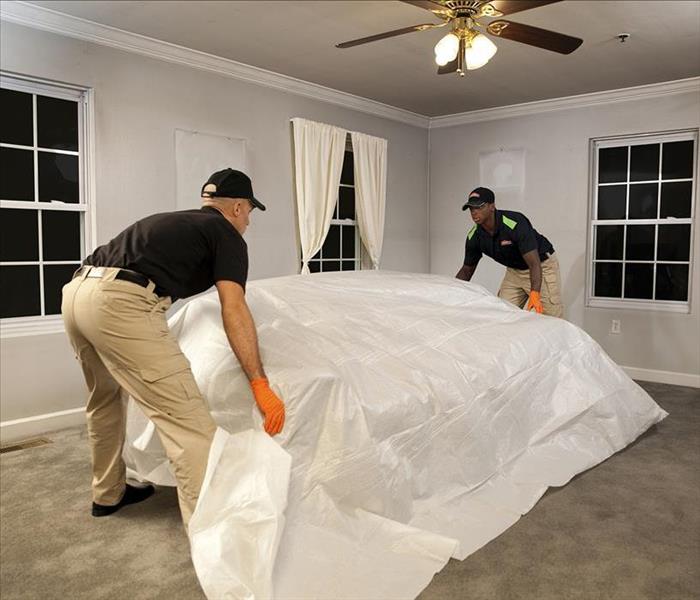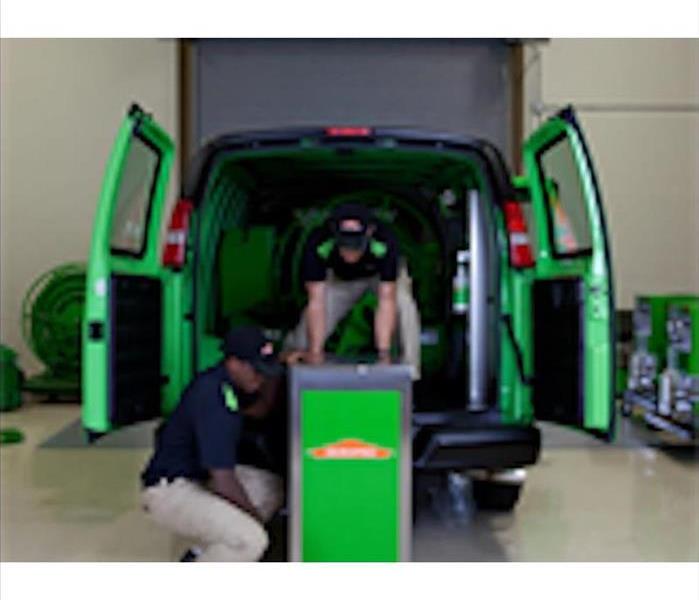Rapid Response is CRUCIAL
2/25/2020 (Permalink)
 Call the cleanup team that is faster to any size disaster.
Call the cleanup team that is faster to any size disaster.
The first 48 hours after a fire damage can make the difference between restoring versus replacing damaged property and personal belongings. Rapid response and timely mitigation can help prevent fire damage from creating long-term problems.
Your local SERVPRO franchise professionals understand that returning to normal is your primary concern. SERVPRO response teams are trained in caring for both you and your property. By responding quickly with a full line of fire cleanup and restoration services, your local SERVPRO franchise professionals can help you get your home or business back up and running quickly and help protect your property and belongings.
If your home or business suffers a fire damage, contact your local SERVPRO franchise professionals to help make it "Like it never even happened."
Fire Safety Means Accident Prevention
2/13/2020 (Permalink)
House fires can be extremely devastating. The National Fire Protection Association reports that there are as many as 400,000 house fires every year in the United States. Fortunately, there are things you can do to protect your home, and your loved ones, from the danger of fire. It’s important to educate everyone in the home about fire safety, particularly if you live in a dry, hot area, and make sure they are all aware of an emergency plan: how to escape, where to meet and how to stay safe while doing it. Always keep matches, lighters and flammable objects away from children and teach them about the dangers of “playing” with such items. Talking about fire safety is crucial to prevention.
Thomas Walker is the founder of Home Safety Hub, a platform dedicated to finding resources and educational materials to help keep people safe. Below are a few of the best tips he shared on how to keep your home flame-free.
1. Check your heating
Any type of heating within the home needs to be checked regularly, whether it’s a gas-fueled furnace or a kerosene heater. Fireplaces should be cleaned often, including the chimney. Electric floor heaters should have cords in perfect condition and should be kept away from curtains and thick carpeting. Never leave a kerosene heater or gas lamp going during the night.
2. It’s electric
Don’t neglect electrical outlets or allow them to become overloaded. If your home is older than ten years, it’s a good idea to have the electric wiring checked by a professional. Never place cords or surge protectors under rugs or furniture.
3. Sound the alarm
Check smoke alarms and carbon monoxide detectors every six months to ensure the batteries are in good working order. Make sure there is an alarm in every bedroom and in the kitchen and any garage space, along with fire extinguishers.
4. Cooking consciously
Never leave stovetop items unattended, especially if you have a gas range with an open flame. Turn the handles of pots and pans away from the walkway so that they can’t be accidentally knocked off the stove. Keep the stove clean at all times and de-grease often.
5. Have a plan
It’s crucial to have a plan on what to do in case of emergency and share it with your family, making sure everyone knows the safest way to escape in the event of a fire, where to meet if the family is separated, and who to call. When it comes to family members with disabilities, the plan is going to have to take these disabilities into account. It may change depending on what the disability is.
Be sure to read through The National Fire Protection Association’s guide to escape plans for people with disabilities, which offers tips covering the five general categories of disabilities (mobility, visual, hearing, speech and cognitive) as well as what it describes as the “four elements of evacuation information that occupants need,” which include notification, way finding, use of the way and assistance.
Remember that fire safety begins at home. Teaching your family about the best ways to protect themselves from fire will not only give you peace of mind, but it may come in handy someday as well. In addition to saving lives, it can save a lot of headaches. Even a fire that claims no casualties can leave quite a mess to clean up.
For Homeowners, Putting Out a Fire Can Be Worse Than the Fire Itself
1/9/2020 (Permalink)
 We're here to help.
We're here to help.
A backdraft of emotions often sweeps over the homeowners after a fire ravages a home. Fear, uncertainty, stress and doubt about the future of the property can overwhelm the homeowner long after the flames have been extinguished and the smoke has cleared.
The first 48 hours after a fire damage can make the difference between restoring versus replacing your property and personal belongings. So after the first wave of heroes have rescued the property, let us help you restore it. With the industry-approved training to employ rapid response, the utmost professionalism, cutting-edge technology and open communication, we strive to restore not only the home, but the customer's peace of mind, as well. Our professionals can help prevent fire damage from creating long-term problems. We provide timely response with mitigation services ranging from fire, smoke and soot removal to contents claims inventory and document restoration. These services help ensure your property, belongings and memories are restored to preloss condition when possible.
So, before you risk doing further damage by attempting to clean up the damage yourself, call the fire damage cleanup and restoration professionals at 814-946-0119.
What to Do Until Help Arrives (Fire & Smoke Damage)
1/9/2020 (Permalink)
 Help is on the way!
Help is on the way!
The first 48 hours after a fire damage can make the difference between restoring versus replacing your property and personal belongings.
DO:
- Limit movement in the home to prevent soot particles from being embedded into upholstery.
- Keep hands clean. Soot on hands can further soil upholstery, walls and woodwork.
- Place dry, colorfast towels or old linens on rugs, upholstery and carpet traffic areas.
- If electricity is off, empty freezer and refrigerator completely and prop doors open to help prevent odor.
- Wipe soot from chrome on kitchen and bathroom faucets, trim and appliances, then protect these surfaces with a light coating of lubricant.
- If heat is off during winter, pour RV antifreeze in sinks, toilet bowls, holding tanks and tubs to avoid freezing pipes and fixtures.
- Wash both sides of leaves on house plants.
- Change HVAC filter, but leave system off until a trained professional can check the system.
- Tape double layers of cheesecloth over air registers to stop particles of soot from getting in or out of the HVAC system.
DON'T:
- Attempt to wash any walls or painted surfaces without first contacting SERVPRO.
- Attempt to shampoo carpet or upholstered furniture without first consulting SERVPRO.
- Attempt to clean any electrical appliances (TV sets, radios, etc.) that may have been close to fire, heat or water without first consulting an authorized repair service.
- Consume any food or beverages that may have been stored close to fire, heat or water. (They may be contaminated.)
- Turn on ceiling fixtures if ceiling is wet. Wiring may be wet or damaged and cause electrical shock, and air movement may create secondary damage.
- Send garments to the dry cleaner. Improper cleaning may set in smoke odor.






 24/7 Emergency Service
24/7 Emergency Service


